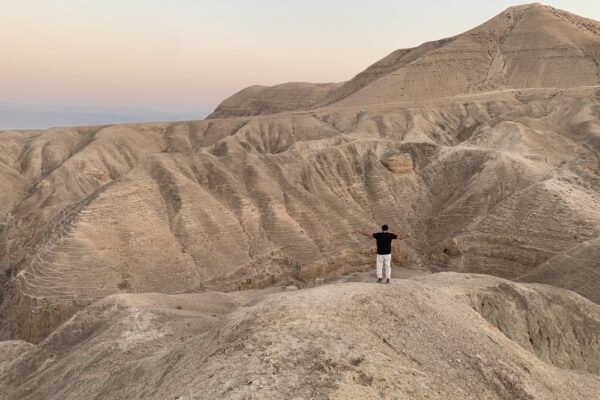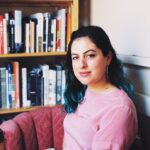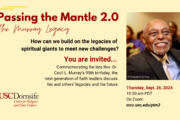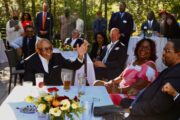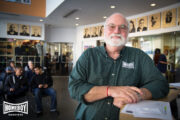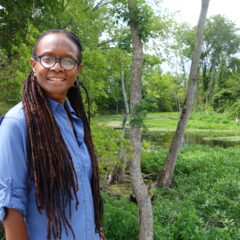This radio documentary was produced by KALW’s The Spiritual Edge, with the support of CRCC’s global project on engaged spirituality.
To hear this and other profiles, subscribe to The Spiritual Edge podcast in your favorite podcasting app, including Apple podcasts, Spotify or Google Podcasts. Find out more on The Spiritual Edge website.
A version of this podcast also ran on The World.
In the Palestinian town of Jericho, customers cycled in and out of a cell phone shop to buy new SIM cards. Sameer, the owner, sat behind a desk, clicking through Youtube for music from his teenage years. He sang along to an anthem about young Palestinians taking to the streets to fight for freedom from the Israeli Occupation. In between verses, he sipped water from a bottle with a piece of amethyst at the bottom. That mineral, Sameer said, is a natural stress reliever. It helps keep him calm and connected to the earth.
Sameer grew up Muslim. He still keeps certain rituals, like fasting during Ramadan. But these days, he said, he’s more into nature – connecting with the hills and the trees.
Unlike many Palestinian men in their 40s, Sameer lives alone. He’s a big guy, with a dark beard and moustache, and curly dark brown hair. Around his left wrist, he wears three strands of olive pits. He carved them into beads when he was a teenager, in prison. Since then, he’s had a weak stomach and more sleepless nights than he can count. When he can’t sleep, he plays one song to help him relax.
The song he plays is Shalom Alechem, one that Jewish people sing on the Sabbath, calling on the angels of peace. “Every time I hear it, always I feel relaxed,” Sameer said. “I get touched from this song, maybe because I have that history with it.”
Most West Bank Palestinians and Israelis don’t really get to mix it up. A concrete barrier with checkpoints separates them. So, it may seem curious that a Palestinian man knows Shalom Alechem, this Jewish song, by heart. For years, Sameer’s relationship with the song was also a mystery to him.
As a kid, Sameer didn’t know much about politics. He lived in Jerusalem with his grandparents. No one he knew had much money, but there was never a lack of food. Sameer’s grandfather tended bees for honey and chicken for eggs. His grandmother made fresh bread most mornings. And then, in the late 1980s, when Sameer was in his early teens, the first Palestinian uprising or Intifada began. It started as sort of a grassroots boycott against Israeli industries, social structures and military occupation. Sameer’s parents moved with him from Jerusalem to Jericho.
To Sameer, the intifada showed up as men in helmets outside his school carrying guns. “I was afraid to look at their faces actually.” Sameer said.
Sameer’s mom told him that these people were Jews. To Sameer, Jews were men with guns who forced Sameer’s neighbors out of their homes at night to clean graffiti from the walls of private homes and pick garbage off the streets. Jews were men who shouted, in a garbled, strange language.
Back then, Sameer’s mom gave him raw onions every night before bed to keep by his side, because it can protect against tear gas. One night when Sameer was 13 years old, he woke up to the sound of two-way radios inside his house. “I was terrified,” Sameer said. “I peed on my pants.”
That night, Israeli soldiers grabbed Sameer’s father’s arm and took him. He didn’t return until morning. When Sameer woke up, he saw his mother putting olive oil on his father’s body. “I saw blue marks on his body and for me, that was a big change in my life,” Sameer said. “It’s like something boiling inside you. Like a volcano boiling”
Sameer felt better when he was out with friends, throwing stones at tanks. For him, it wasn’t a political thing. Rather, he wanted to let the soldiers know his presence. “ We are here. You are not breaking us,” Sameer says.
One night, some of those soldiers showed up in Sameer’s bedroom and took him to a prison in the North of Israel. They arrested him for hanging outlawed Palestinian flags. After they locked him up, his political education began in earnest. He says fellow detainees ran a kind of seminar. “I learned more how to hate Jewish people,” Sameer says.
In prison, 15-year-old Sameer learned that Jews forced Palestinians from their homes. They unjustly detained them. They took their land. He learned he’d have to spend the rest of his life fighting Jews for his people’s freedom. When the Israelis released Sameer after nearly a year, he hitched a ride back to Jericho, where relatives and friends welcomed him as a kind of celebrity. “I was sitting and talking like a hero about my experience,” Sameer said. “I felt shy and I felt proud.”
At this point, Israelis had placed Palestinian towns under strict curfew – schools were closed. So were shops. Sameer kept tagging walls with graffiti, hanging the Palestinian flag, singing resistance songs with friends. “I was fighting freedom for everything,” Sameer said.
And then in 1993, a peace deal called the Oslo accords came through. Sameer was nearly 20. He was intrigued by the prospect of Palestinians ruling their own people while living side by side with Israelis. So, when Palestinian officials in Jericho offered him a job as a police officer, partly to keep order during the fragile peace process, he took it.
Sameer had been working as a policeman for years when one morning, news surfaced about Israelis excavating tunnels under a site sacred to Muslims and Jews. Violent clashes erupted throughout the region. Just outside Jericho, dozens of Palestinian men headed toward a Jewish settlement. “They were angry and they were carrying stones in their hands,” Sameer says.
Sameer was under orders to prevent the Palestinians from getting there . But when he showed up at the demonstration with his Kalashnikov rifle, Israeli soldiers had already arrived, and were shooting at the demonstrators. Sameer didn’t know what to do – should he join the soldiers or the demonstrators?
Palestinians shouted at him and the policemen, calling them traitors. Sameer ran and hid behind a rock. In the chaos, he saw a one of his best friends from childhood, Firas. I called him to come,” Sameer said. “And then I saw him falling down.”
A Red Crescent ambulance took Firas to a hospital. That day, Sameer took a bullet in his leg. He ended up in an ambulance, too. When he got to the hospital, he learned Firas had died. “It was lighting this Volcano again,” Sameer said. “Bringing this volcano to life again. I was boiling. I was mad.”
Sameer walked out of the hospital straight to the police station to grab bullets. Firas’s funeral was already happening. Hundreds of people accompanied his coffin, hailing him as a martyr. “And I said in front of everyone,” Sameer recalls. “Firas, it’s on me. I will take the revenge for you. From there, another journey started…an awful one.”
From there, Sameer quit his job and started working with Palestinian fighters from all over the West Bank. He was in his mid-twenties at the outbreak of the second intifada – much more violent than the first.
Militias ran this fight. Sameer helped them transport weapons and ammunition. He decided to get a degree in electrical engineering, and did other things he doesn’t want to talk about. Over 5 years, thousands of people – Palestinians AND Israelis died amid the uprising. Toward the end of the intifada, Sameer went into hiding – sleeping in empty farm houses and caves. He was afraid to go home because – he says – the Israelis were after him.
By the time the second intifada ended in 2007, Sameer was in his 30s. He’d spent most of his life fighting for his people. But Palestinians were still living under occupation. Sameer was angry that their leadership was giving up. He wasn’t ready to stop fighting.
In the months that followed, Sameer emerged from hiding and did a lot of… walking. One night he was walking the streets of Bethlehem. It started to rain, and he tried waving down cars to hitch a ride home to Jericho. The driver who pulled over was an old friend – one of the men who’d brought Firas to the ambulance years before, back when Sameer worked as a policeman. The driver invited Sameer to a group dinner at a hotel down the road.
Sameer imagined a group of nice people, but when he and the driver walked into the room, he saw someone wearing a yarmulke on his head. “And I said, what is this Jewish guys doing here?” Sameer asked the driver. “And he said, he’s part of the group. And I said – but he’s Jew! And he said – all of them are Jews.”
Sameer left the hotel. He stood outside in the rain, and lit a cigarette. “Something pulled me back.” He said.
From a distance, Sameer listened in on the meeting. He heard a former Israeli pilot talk about his time as a soldier in Gaza, when he refused to fire at a building. Sameer had never heard a Jew talk about having complicated feelings around anything. He described this moment as a break in his understanding of Jews as sort of an evil monolith. “And I went back with the crack with the big, like, let’s say, not the big, but small crack in my mind.” Sameer said.
Sameer felt confused, and also relieved. He felt relieved that there might be an escape from his constant fear of Jews, and relieved that there might actually be a chance at living with them, instead of under them.
Sameer kept this to himself. The more he thought about it, the more questions he had about Jews – what did the inside of their homes look like – did they have lovers? Pets? And what did they think about him – a Palestinian fighter?
After three months, he showed up at another meeting with Israelis. It was a 3 day retreat, which led to a project to invite Israelis to the Palestinian West Bank. Sameer immersed himself fully in this Visit Palestine project. He guided more than three-thousand Israelis on tours of the West Bank.
About a year into the project, in 2011, an Israeli friend invited Sameer to a Shabbat dinner in his home. Sameer sat around a table set with wine glasses. He saw a framed portrait of a soldier on the wall. In an Israeli home, he didn’t feel entirely comfortable. His hosts started singing, and Sameer recognized the tune.
“I was shocked and said, how [do] I know this thing? What is this song?”
Sameer was almost in tears. He couldn’t remember where he’d heard the song before – or why it triggered such an emotional response. When he got home, he searched the internet. He found the song and played it for weeks – again and again on his cell phone. “And then I remembered where this came from,” Sameer said.
When he was 15 years old in Israeli prison, he was placed into a cold solitary confinement cell. “It’s dark. It’s stinky. It’s a hard floor. There’s no mattress even,” He said. “Your body’s not giving you an opportunity to rest because you have to stay awake to take care of it.”
He remembers he hadn’t slept in days. He felt he was losing his mind. And then, from out of nowhere, he heard a tune. It disappeared in the wind, and then came back. “ I put my ear closer to the wall to hear it. And I felt relaxed.” Sameer said.
Back then, Sameer didn’t know whether the voices he heard were a hallucination, or just the wind. All he knew was that when he heard it, he was able to sleep. Day after day, he put his head to the wall in order to hear the tune again, but he couldn’t hear it. Eventually, he gave up. “And after a few days,” he said, “ I heard it again.”
Sameer didn’t know it was the soldiers outside his cell, singing Shalom aleichem for the Jewish Sabbath
Hearing the song twenty two years later at the home of his Israeli friend, he felt shock. He felt shock that even in the depths of his anger toward Jews, a Jewish song – a song all about peace – had put him at ease. “This song helped me to feel safe in an unsafe place,” Sameer says.
These days, Sameer says sharing a melody with Jewish Israelis makes him feel closer to them – connected on some sort of higher level. It puts him at ease during potentially scary moments of contact with them. Like, each time Sameer enters Israel and has to cross a checkpoint, as every west bank Palestinian must. When he’s waiting in line for hours late at night with dozens of men and women, inching towards a turnstile, while teenaged Israeli conscripts in bulletproof vests gaze at him as he takes off his belt and empties his pockets onto a conveyor belt. While they search his plastic bag filled with fresh grapes. Sameer feels more at peace in these moments than he did as a younger man because, he says, he feels more of a connection to Israelis, even soldiers. “ Like, I’m not, I’m not justifying what [they’re] doing, but I know this soldier is a human being,” Sameer says.
That feeling of connection also fuels his activism. Along with running his cell phone store, Sameer dedicates the bulk of his time to organizing former Israeli and Palestinian fighters to end the Israeli occuption with a group called Combatants for Peace. The group works to end the Israeli occupation with peaceful actions, like rebuilding schools the Israelis have demolished, and talking to people all over this tiny, divided land about what it’s like to grow up on the other side of the wall.
One teenage Israeli girl Sameer spoke with at a summer camp says opportunities for Israelis to meet Palestinians face to face are rare, and important. She said in her previous school, there was a common saying: “A good arab is a dead arab. It’s awful and people see them [Palestinians] as a group of terrorists. That’s what we see in our reality. Terrorists,” She said. It’s very important to get to know the people and to know that they are not just one.”
Sameer’s resistance these days is non-violent. He harbors no regrets about his actions during the intifadas. “A lot of people ask me in my talks,” he said, “Are you sorry for doing what you were doing? And, no. I’m not apologizing. Listen, my people have no choices.”
No choices, Sameer said, is the way he felt about throwing stones when he was younger.
As an adult, he feels that that strategy didn’t work. Since he was a teenager, Israel’s restrictions on Palestinians have gotten worse. So, he’s changed his tactics and held to the same goal. “When I visit a family in Israel for example, I give these kids an opportunity to see a Palestinian as friend of their father. That will make them different when they have to serve in the army,” he said.
Sameer might not end Israeli Occupation this way, but he feels he has no choice but to work to make himself human in the eyes of Israelis, in order to protect himself and his people. “The goal is: they will accept me more and the reasons i’m resisting. That will make both of us safe. They will not come to attack me, and Ii will not attack them back,” he said.
None of this is easy for Sameer. He said people don’t respect him the way they used to. His status as a leader in the movement for peace – one who hangs out with Israelis – doesn’t earn him the same kind of respect he got as a police officer – or a fighter in the resistance. It’s a lot of work and a lot of pain, he said. But he feels it’s his duty to make change, and to help people find peace. He believes in peace because, he said, his life has been changed by living it.
Sameer still gets angry when hears of Palestinian hosues being demolished, airstrikes in Gaza, or stabbings in Jerusalem. He feels angry when he’s walking in Israel, and senses that people are afraid of him. “I feel sad and mad and disappointed,” he said. “And sometimes I cry because we didn’t stop this yet.”
That’s why he keeps working for peace, he said. “Because by violence I will not stop demolishing houses, but by peace, by putting this in public, by going with Israelis together to rebuild their houses,” he said, “That’s the resistance I’m doing.”
Now, he has a special ritual to release anger. He hikes out, deep into the desert, and walks to this one spot on the edge of a dusty rock formation. It juts down into a steep echoey ravine – or wadi – surrounded by rocks.
He took me there one late afternoon last summer. The desert glowed rusty brown and pink. While we walked toward the Wadi, Sameer pointed to a spot in the rocks and told me about a time he sat there, and a fox came close to him. “We were both scared and excited,” he said. “It wasn’t an attacking position, it was trying to be cute. I gave him watermelon and he took it and ran away.”
Sameer had no idea that foxes liked to eat watermelon. He said he thinks the fox came to him because the fox knew he had a peaceful soul.”He feels safe coming to me,” Sameer said. “It gives me that feeling that I am not that harsh spirit anymore.”
When we got to the Wadi, Sameer said when he feels useless and angry, he comes to scream. He likes to hear the echo. “It feels like letting go, like releasing,” he said. “It feels like taking off very heavy things from your shoulders. Maybe releasing the pain, or cleaning the heart.”
We inched toward the edge of a rock, and Sameer looked down into a deep ravine. He asked me if I wanted to scream with him. Together, we screamed.
Click here to listen to the radio documentary on spiritualedge.org.
Shaina Shealy is a journalist fellow with the Spiritual Exemplars Project.
